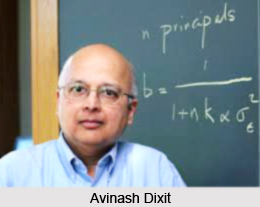 Avinash Kamalakar Dixit is an Indian economist of contemporary era who currently joined in John J. F. Sherrerd `52 University as Professor of Economics Emeritus at Princeton University. He is an Indian-American economist.
Avinash Kamalakar Dixit is an Indian economist of contemporary era who currently joined in John J. F. Sherrerd `52 University as Professor of Economics Emeritus at Princeton University. He is an Indian-American economist.
Early Life of Avinash Kamalakar Dixit
Avinash Kamalakar Dixit was born on August 6th, in the year 1944 in Mumbai, Maharashtra. Avinash Kamalakar Dixit, a B.Sc. from Bombay University in 1963 in Mathematics and Physics, a B.A. from Cambridge University in 1965 in Mathematics (Corpus Christi College, First Class), and a Ph.D. in 1968 from the Massachusetts Institute of Technology in Economics.
Career of Avinash Kamalakar Dixit
Avinash Kamalakar Dixit has been the John J. F. Sherrerd `52 University Professor of Economics at Princeton University since July 1989. Avinash Kamalakar Dixit is also a distinguished Adjunct Professor of Economics at Lingnan University (Hong Kong) and Senior Research Fellow at Nuffield College, Oxford. Avinash Kamalakar Dixit previously taught at Massachusetts Institute of Technology, at the University of California, Berkeley, at Balliol College, Oxford and at the University of Warwick. He is currently John J. F. Sherrerd `52 University Professor of Economics Emeritus at Princeton University.
Award Received by Avinash Kamalakar Dixit
In the year 1994, Avinash Kamalakar Dixit received the first-ever CES Fellow Award from the Centre for Economic Studies at the University of Munich. In January 2016, he is conferred the Padma Vibhushan Award, which is the second highest of India`s civilian honours to Avinash Kamalakar Dixit.
Other Works of Avinash Kamalakar Dixit
Avinash Kamalakar Dixit has also held visiting scholar positions at the International Monetary Fund and the Russell Sage Foundation. Avinash Kamalakar Dixit was President of the Econometric Society in 2001, and was Vice-President (2002) and President (2008) of the American Economic Association. Avinash Kamalakar Dixit was elected to the American Academy of Arts and Sciences in 1992 and the National Academy of Sciences in 2005.
Books by Avinash Kamalakar Dixit
Avinash Kamalakar Dixit is author of "Investment Under Uncertainty". It is the first text-book exclusively about the real options approach to investments in India under global scenario. It is described as "a born-classic" in view of its importance to the theory on the ground of economics.




















